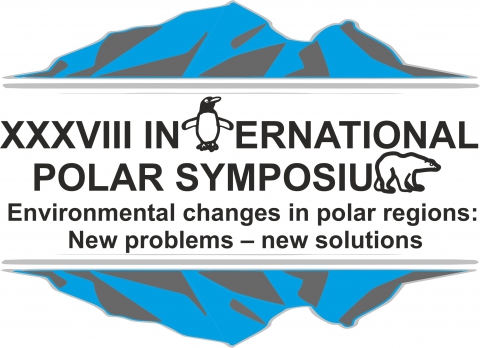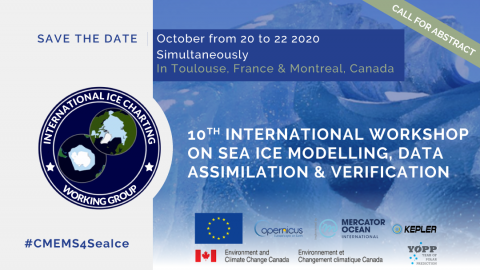Throughout October, IARPC Collaborations will be holding a "MOSAiC Month" focused on the Multidisciplinary drifting Observatory for the Study of Arctic Climate (MOSAiC) expedition. Led by the Alfred Wegener Institute, MOSAiC is the first year-round expedition into the central Arctic exploring the Arctic climate system. The backbone of MOSAiC is the year-round operation of R/V Polarstern, which has been drifting with the sea ice across the central Arctic with researchers setting up a distributed regional network of observational sites.
This webinar features five early-career researchers who recently participated in the MOSAiC expedition. Each will give a 3-5 minute lightning talk about their research and experience. There will be time for questions at the end of the lightning talks.
All are welcome to attend this webinar – early-career researchers, established researchers, and members of the public are all encouraged to join. Register here.
Agenda
Zoom intro & IARPC overview (5 min)
Lightning talks (3-5 min each)
Summer on the MOSAiC floe: Rapid melt, declining albedos, and implications for climate modeling – Maddie Smith
MOSAiC: An early-career perspective – Carrie Harris
Winter energy cascade in the upper central Arctic Ocean inferred from MOSAiC Leg 1 observation – Ying-Chih Fang
Observations of Arctic atmospheric boundary layer with small unmanned aerial vehicles during Leg 3 of MOSAiC – Gina Jozef
Sea ice coring & methane cycling in the Arctic Ocean – Michael Angelopolous
Q&A – 20-30 min
Speaker Bios
Maddie Smith
Maddie Smith is a postdoctoral scholar in the Polar Science Center at the Applied Physics Lab. Her current research uses observations from the MOSAiC expedition to improve representation of sea ice processes in a coupled global climate model (CESM), with a focus on lateral melting and sea ice albedos. She was a participant on Leg 4 of MOSAiC (June-August), and also has prior fieldwork experience on field campaigns in both the Arctic and Southern Oceans. General research interests include ice-ocean interactions, sea ice thermodynamics, sea ice modeling, and surface waves and turbulence.
Carrie Harris
Carolynn (Carrie) Harris is a PhD student at Dartmouth College in the USA. Her research interests include biogeochemistry, stable isotope geochemistry, and polar systems. Carrie is passionate about making polar science more safe and welcoming for all. She is an Outreach Ambassador for the MOSAiC Expedition and a member of leadership for the Association of Polar Early Career Scientists.
Ying-Chih Fang
Ying-Chih Fang is a physical oceanographer and postdoctoral sciences in the Section of Physical Oceanography of the Polar Seas at the Alfred Wegener Institute. His career focuses on using knowledge of physical oceanography to explore important information hidden in the data. He joined MOSAiC’s Team Ocean during MOSAiC Leg 1.
Gina Jozef
Gina is a PhD student in the Department of Atmospheric and Oceanic Sciences at CU Boulder, affiliated with the Cooperative Institute for Research in Environmental Sciences. Her research focus is boundary layer meteorology of the Arctic. She recently participated in the MOSAiC Expedition, flying unmanned aerial vehicles (drones) to collect advanced atmospheric measurements of the boundary layer over the Central Arctic Ocean sea ice pack. Before beginning graduate school, she obtained her undergraduate degree at Colorado College in environmental sciences with a concentration in physics.
Michael Angelopoulos
Michael is a PhD student at the Alfred Wegener Institute (AWI) in Potsdam, Germany, researching sub-aquatic permafrost beneath thermokarst lakes, lagoons, and seas in the Siberian Arctic and along the Alaskan coast. He is particularly interested in salt transport impacts on sub-aquatic ice-bearing permafrost evolution and gas movement in the sediment. At AWI, he also took part in MOSAiC, where he spent four months on the Polarstern icebreaker exploring sea ice and methane cycling in the Arctic Ocean. Before joining AWI, he worked for four years as a consultant for Golder Associates, where he specialized in mining and oil & gas development projects in permafrost regions. He holds an MSc from McGill University (Montreal, Quebec, Canada) and is a licensed Professional Geoscientist (P. Geo) in Ontario, Canada. Long-term, he hopes to expand his research to investigate extreme terrestrial environments as analogues for Mars.


